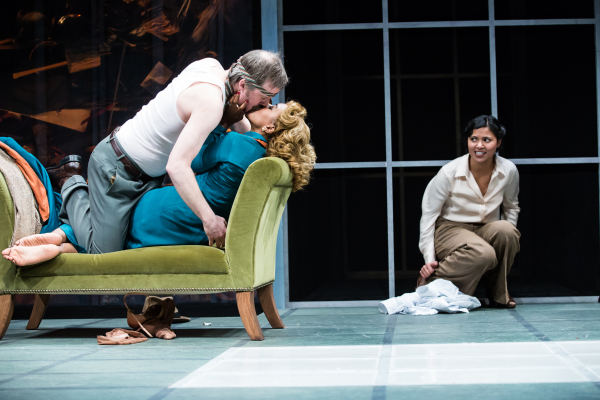No Exit
(They can’t get no) satisfaction in Jean-Paul Sartre’s uncommonly-pleasant-looking depiction of hell.

(© Al Foote III)
Hell is other people: That is the startling (and oft cited) epiphany of Cradeau, one of the three characters in Jean-Paul Sartre's 1944 play No Exit, now receiving a revival at The Pearl Theatre Company. Cradeau's revelation may be true, but in director Linda Ames Key's intelligent and well-acted production, it is only part of the story.
No Exit presents the audience with 90 minutes in hell. Rather than fire and brimstone, this hell has purple wallpaper, multicolored divans, and a nonthreateningly modernist sculpture that wouldn't look out of place in a corporate boardroom. Cradeau (Bradford Cover) enters the room trailing a heel-clicking valet (Pete McElligott) who looks like he just stepped off the set of The Grand Budapest Hotel. Cradeau is a journalist and intellectual, so he knows where he is and why. He's completely caught off guard, however, by the arrival of Inez (Jolly Abraham), a short-tempered lesbian postal worker who hates men on principle. Estelle (Sameerah Luqmaan-Harris), a preening and falsely cordial socialite, completes the trio. They spend the rest of eternity (90 minutes for us) tormenting each other with their perfectly matched (by Satan) set of quirks and predilections.
The overwhelming feeling of this production oscillates between expectation and disappointment. It is not enough to deprive someone of all comfort: Comfort must be dangled in front of them for a period and then yanked away right before the moment of satisfaction. Inez lusts for Estelle. Cradeau lusts for Estelle. Estelle just wants to feel desired (but is not a lesbian), so the obvious choice is Cradeau, right? Yet the moment Cradeau and Estelle are about to consummate their relationship, Inez plays the role of coitus interrupter, delivering a perfectly timed set of theatrical blue balls on a silver platter. These people are never getting out of here.
Harry Feiner's set is both functional and beautiful. The divans are plush and luxurious, but not quite big enough to allow someone to comfortably recline. The wallpaper scrim disappears in Ann G. Wrightson's lighting to reveal a mountain of possessions (bed frames, chandeliers, radios) reinforcing this bourgeois prison. Even when the door suddenly opens, offering an exit, none of the inmates take it, preferring to remain in the cell with their tormentors, surrounded by a lifetime supply of meaningless crap. Can you honestly say you wouldn't do the same in a similar situation? The next room in hell might contain people just as terrible, but have no furniture.
All three actors deliver deft performances, but Abraham stands out for her intensity: With a Cheshire grin and eyes like daggers, she expounds upon her earthly delight in invading women's minds and turning them against their male companions. (I wonder what Sartre's partner, bisexual feminist author Simone de Beauvoir, thought about that particular canard.)
While the three characters of No Exit realize that hell is other people, their gradual confessions let us know that they all did a pretty spectacular job of being those "other people" during their mortal existences. Sartre (an avowed atheist) most certainly did not believe in an afterlife, but his experience in Nazi-occupied France was more than enough to convince him of the existence of hell on earth. After a viewing of this thoughtful production, you might consider being a little nicer to the people around you.









